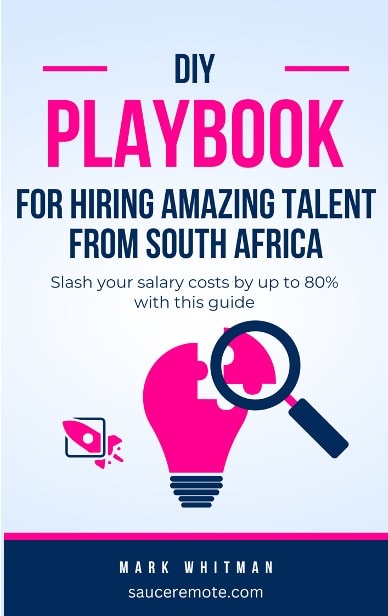So, you're considering hiring Vietnamese employees? Great choice!
Vietnam's booming economy and skilled workforce make it an attractive destination for global businesses.
But how do you navigate the complexities of Vietnamese employment laws?
Enter the Employer of Record (EOR) in Vietnam.
Join me as I delve into how to work with an EOR in Vietnam and why it's your best move for a smooth expansion.
Ready? Let's roll.

Discover how to slash your salary costs by 80%
Get our exact process for hiring amazing overseas talent from South Africa. Includes copy-and-paste templates and a detailed salary guide.
What Is an Employer of Record (EOR) in Vietnam?
An Employer of Record in Vietnam is a third-party organisation that hires employees on your behalf and handles all local legal and administrative responsibilities.
Essentially, the EOR becomes the legal employer while you maintain control over the day-to-day management of your team.
Pro tip: If you're new to the concept, check out my guide on What Does EOR Stand For to get up to speed.
So, why do businesses opt for an EOR in Vietnam?
It's simple:
- Simplified Expansion: You bypass the need to establish a legal entity in Vietnam.
- Compliance Assurance: You navigate local labour laws without worrying about employee misclassification.
- Cost Efficiency: You reduce overhead costs associated with setting up a new branch.
In short, EOR services in Vietnam allow companies to tap into new markets quickly, compliantly, and affordably.
But why exactly do you need an EOR to access Vietnam's dynamic labour market?
Let's dive deeper.
Hire remote talent from South Africa & slash salary costs by 80%
Salaries start from £8,000 per year!
The Vietnamese Employment Landscape
When I first looked into hiring in Vietnam, I found that the country has a complex set of labour laws designed to protect employees.
While this is excellent for workers, it means employers must navigate various regulations.
Here are the most crucial ones:
Working Hours and Overtime
In Vietnam, the standard workweek is 48 hours, typically divided into 8 hours per day over six days. However, many companies operate on a five-day workweek with 8 working hours per day.
Overtime is permitted but should not exceed 30 hours per month or 200 hours per year (in special cases, up to 300 hours per year).
Overtime pay rates are as follows:
- 150% of the regular hourly wage on normal days.
- 200% on weekly days off.
- 300% on public holidays and paid leave days.
For detailed information, refer to the Ministry of Labour, Invalids and Social Affairs (MOLISA).
Compensation and Currency
The local currency is the Vietnamese Dong (VND), and employees are generally paid in this currency.
Vietnam has regional minimum wages that vary depending on the location:
- Region I (Urban areas like Hanoi and Ho Chi Minh City): Highest minimum wage.
- Regions II, III, and IV: Gradually decreasing minimum wages in less developed areas.
While not legally required, it's common for companies to offer a "13th-month" salary as a Tet bonus, aligning with the Lunar New Year celebrations—a significant incentive for employees.
Hire remote talent from South Africa & slash salary costs by 80%
Salaries start from £8,000 per year!
Public Holidays and Annual Leave
Vietnam recognises 11 public holidays annually. Employees are entitled to these days off with full pay. If a holiday falls on a weekend, the following weekday is a paid day off.
Employees are also entitled to 12 days of paid annual leave per year, increasing by one additional day for every five years of service.
Tax Obligations and Contributions
Ah, taxes—the necessary part of doing business. Employers in Vietnam must navigate several tax obligations:
Personal Income Tax (PIT):
Employers are responsible for withholding PIT from employees' salaries, with progressive rates ranging from 5% to 35%.
Social Insurance Contributions:
Both employer and employee must contribute to social insurance funds, including Social Insurance, Health Insurance, and Unemployment Insurance.
Employer Contributions:
- Social Insurance: 17.5%
- Health Insurance: 3%
- Unemployment Insurance: 1%
Employee Contributions:
- Social Insurance: 8%
- Health Insurance: 1.5%
- Unemployment Insurance: 1%
For more details, visit the General Department of Taxation of Vietnam.
Hire remote talent from South Africa & slash salary costs by 80%
Salaries start from £8,000 per year!
Leave Policies and Parental Leave
Vietnamese employees are entitled to various types of leave:
- Sick Leave: Employees are entitled to sick leave compensated by Social Insurance, not the employer. The duration depends on working conditions and Social Insurance regulations.
- Maternity Leave: Female employees are entitled to six months of maternity leave. Additional leave is available for multiple births.
- Paternity Leave: Male employees are entitled to 5 to 14 days of paid paternity leave, depending on the circumstances.
Probation and Termination Periods
Vietnamese workers can expect the following:
Probation Period:
Typically up to 60 days for positions requiring professional qualifications and 30 days for other roles.
Notice Period for Termination:
- 45 days for indefinite-term contracts.
- 30 days for definite-term contracts (12 to 36 months).
- 3 working days for seasonal or specific jobs less than 12 months.
Understanding and adhering to these regulations is vital to avoid legal issues and financial penalties. But don't worry—with local expertise, this becomes manageable.
This is where partnering with an EOR in Vietnam becomes invaluable.
An EOR in Vietnam ensures that all employment practices comply with local laws, allowing you to focus on your core business activities.
So, how do you choose the best Vietnamese EOR service?
Let me show you how.
Hire remote talent from South Africa & slash salary costs by 80%
Salaries start from £8,000 per year!
How to Choose a Vietnamese EOR Service
Selecting the right Employer of Record (EOR) service is crucial for successfully hiring Vietnamese employees.
Here are some key factors to consider when choosing an EOR provider:
1. Expertise in Vietnamese Labour Laws
Ensure the EOR has in-depth knowledge of Vietnamese employment laws and regulations. This expertise is essential to maintain compliance and avoid legal pitfalls.
An experienced EOR will be well-versed in the Vietnamese Labour Code and can guide you through the complexities of local employment contracts, tax obligations, and worker rights.
2. Comprehensive Service Offering
Look for an EOR that provides a full suite of services, including payroll management, tax compliance, benefits administration, and legal support.
A comprehensive service ensures that all aspects of employment are managed efficiently, allowing you to focus on your core business operations without administrative burdens.
3. Transparent Pricing Structure
Transparent pricing helps you budget accurately without unexpected costs down the line. Make sure the EOR provides clear information on fees and any additional charges.
A reputable EOR should offer a detailed pricing structure upfront, eliminating hidden fees and enabling precise financial planning.
4. Personalised Solutions
Your business has unique needs. An EOR that offers tailored solutions can better support your specific requirements and growth objectives.
Seek out providers who take the time to understand your business goals and offer customised services that align with your expansion strategy.
5. Reputation and Client Testimonials
Research the EOR's track record. Positive reviews and testimonials from other clients can provide insight into the quality of their services.
Look for case studies or ask for references to assess the provider's experience and reliability in facilitating successful expansions into Vietnam.
6. Local Presence and Cultural Understanding
An EOR with a local presence can offer valuable insights into the Vietnamese market and culture, facilitating smoother operations.
Local expertise aids in navigating cultural nuances and business practices, enhancing communication and employee integration.
Sounds too complicated? Don’t worry. I have a solution.
Hire remote talent from South Africa & slash salary costs by 80%
Salaries start from £8,000 per year!
Considering Alternative Labour Markets
While Vietnam offers significant opportunities, exploring alternative markets might align better with your business objectives.
For instance, South Africa presents a dynamic economy with a robust labour market and favourable business conditions.
If hiring South African employees appeals to you, partnering with an experienced Employer of Record in South Africa, like Sauce, can simplify the process.
Sauce specialises in South African employment laws and provides comprehensive services to help businesses hire excellent employees smoothly and compliantly.
My Final Thoughts
And there you have it: Hiring Vietnamese employees doesn't have to be daunting. With the right support from an Employer of Record in Vietnam, you can effortlessly navigate the complexities of local employment laws.
